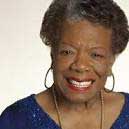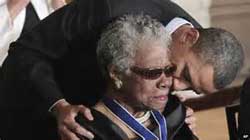MAYA ANGELOU , a child of the Jim Crow South who rose to international prominence as a writer known for her frank chronicles of personal history and a performer instantly identified by her regal presence and rich, honeyed voice, died May 28 at her home in Winston-Salem, N.C. She was 86.

Her literary agent, Helen Brann, confirmed the death but said she did not know the cause. Ms. Angelou had heart ailments and had been in declining health for years.
She established her literary reputation in 1970 with “I Know Why the Caged Bird Sings,” a memoir detailing the racism and abuse she endured during her harrowing childhood.
From her desperate early years, Ms. Angelou gradually moved into nightclub dancing and from there began a career in the arts that spanned more than 60 years. She sang cabaret and calypso, danced with Alvin Ailey, acted on Broadway, directed for film and television and wrote more than 30 books, including poetry, essays and, responding to the public’s appetite for her life story, six autobiographies.
She won three Grammy Awards for spoken-word recordings of her poetry and prose and was invited by President-elect Bill Clinton to read an original poem at his first inauguration in 1993, making her the second poet, after Robert Frost, to be so honored.
The poem she read, “On the Pulse of Morning,” spoke of a hope that the country’s diverse people would find new unity after chapters in U.S. history of oppression and division.
“Lift up your eyes upon /The day breaking for you,” she said as the nation watched. “Give birth again /To the dream.”
In 2011, President Obama presented her with the Presidential Medal of Freedom, the nation’s highest civilian honor. In a statement Wednesday, Obama described Ms. Angelou as “a truly phenomenal woman” and his sister Maya’s namesake. “A childhood of suffering and abuse actually drove her to stop speaking – but the voice she found helped generations of Americans find their rainbow amidst the clouds, and inspired the rest of us to be our best selves,” Obama said.
It was her story of personal transformation in “I Know Why the Caged Bird Sings” that launched Ms. Angelou’s career and brought her wide recognition as a symbol of strength overcoming struggle.
“She brought an understanding of the dilemmas and dangers and exhilarations of black womanhood more to the fore than almost any autobiographer before her time,” said Arnold Rampersad, a literary critic and professor emeritus of English at Stanford University. “She challenged assumptions about what was possible for a poor black girl from the South, and she emerged as a figure of courage, honesty and grace.”
The idea for “I Know Why the Caged Bird Sings” arose during conversations with friends, including James Baldwin, whom she met in Paris. Ms. Angelou initially resisted the suggestion that she write her story, giving in only after an editor goaded her by suggesting that writing autobiography as literature was too difficult for anyone to do well.
“I Know Why the Caged Bird Sings” focused on growing up in her grandmother’s care in segregated Stamps, Ark., and on her rape by her mother’s boyfriend at age 7, “a breaking and entering when even the senses are torn apart.”

After she spoke her attacker’s name, he was found kicked to death in a lot behind a slaughterhouse. Convinced that her voice had the power to kill, she fell nearly silent for nearly five years. She spoke only to her beloved older brother, Bailey.
“I had to stop talking,” she wrote. “I walked into rooms where people were laughing, their voices hitting the walls like stones, and I simply stood still — in the midst of a riot of sound. After a minute or two, silence would rush into the room from its hiding place because I had eaten up all the sounds.”
The book, which came at the leading edge of a renaissance in literature by black female writers such as Toni Morrison and Alice Walker, traces the young Ms. Angelou’s effort to recover her voice and a sense of control over her body and her life, beginning with her recitation of “A Tale of Two Cities” at the behest of a family friend.
Enduringly popular, “I Know Why the Caged Bird Sings” has been translated into 17 languages, sold more than 1 million copies and still appears on high school and college reading lists.
“There isn’t any easy, which is to say false line in the book,” wrote the novelist Ward Just in a Washington Post review. “It is not propaganda nor a history of the blacks, nor, most blessedly, sociology. It is one woman, Maya Angelou, writing about her life and times and writing from a talent so strong as to make each part of it immediate, direct, devastating and — oddly — beautiful.”
Ms. Angelou produced five subsequent autobiographical volumes, avoiding distractions during her writing days by retreating to hotel rooms, where she removed art from the walls. She often arrived before dawn — dictionary, thesaurus and bottle of dry sherry in tow — and wrote longhand on yellow legal pads.
None of her poetry or prose brought the same acclaim as “I Know Why the Caged Bird Sings,” but critics praised her ability to weave street talk with literary references and the rhythm of church hymns. But in some sense, Ms. Angelou existed in a realm untouched by criticism. She developed a devoted group of readers who adored her and were drawn to her poems, which featured accessible rhymes and themes of cultivating love, conquering injustice and speaking out of silence.
“You may write me down in history /With your bitter, twisted lies,” reads a poem in her 1978 collection, “And Still I Rise.” “You may trod me in the very dirt /But still, like dust, I’ll rise.”
In 2002, she lent her name and verse to a line of Hallmark greeting cards, table runners and other products. “I want my work read,” she told The Post at the time.
Her ability to reach a mass audience, including people who did not consider themselves poetry readers, set her apart. A fixture on the lecture circuit and a popular guest on Oprah Winfrey’s talk show, her personal story became a platform for her message of renewal and hope.
“If God put the rainbows right in the clouds themselves, each one of us in the direst and dullest and most dreaded and dreary moments can see a possibility of hope,” she said in a speech at a conference at Weber State University in Utah in 1997. “Each one of us has the chance to be a rainbow in somebody’s cloud.”
In 1981, Ms. Angelou was appointed a lifetime member of the faculty at Wake Forest University in Winston-Salem. She continued to write, and her works included cookbooks and children’s books. In her many public speaking obligations, often at college commencements, she presented herself as a wise elder whose life was evidence of how far it is possible to travel.
“See me now, black, female, American and Southern,” she said in a 1990 speech to students at Centenary College in Louisiana. “See me and see yourselves. What can’t you do?”
By Emma Brown




.png)









